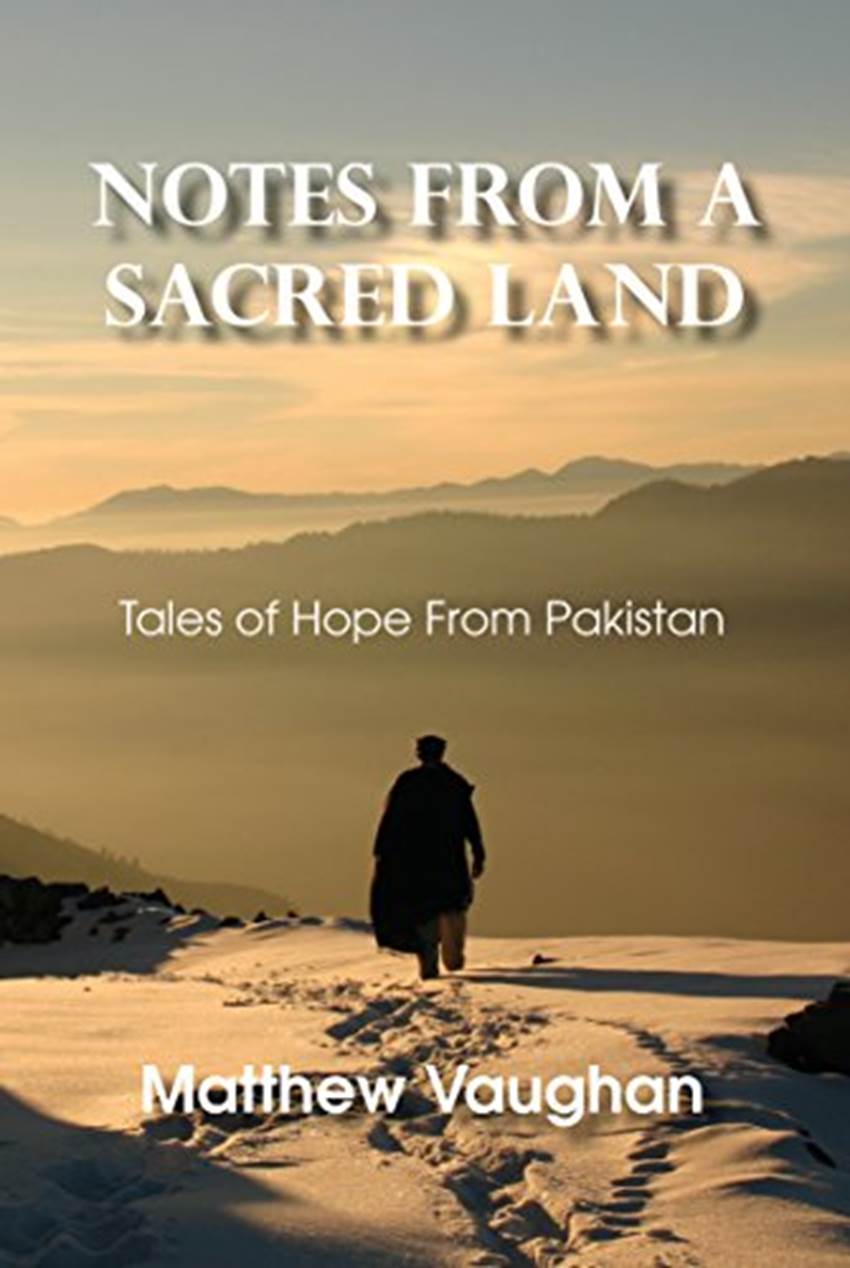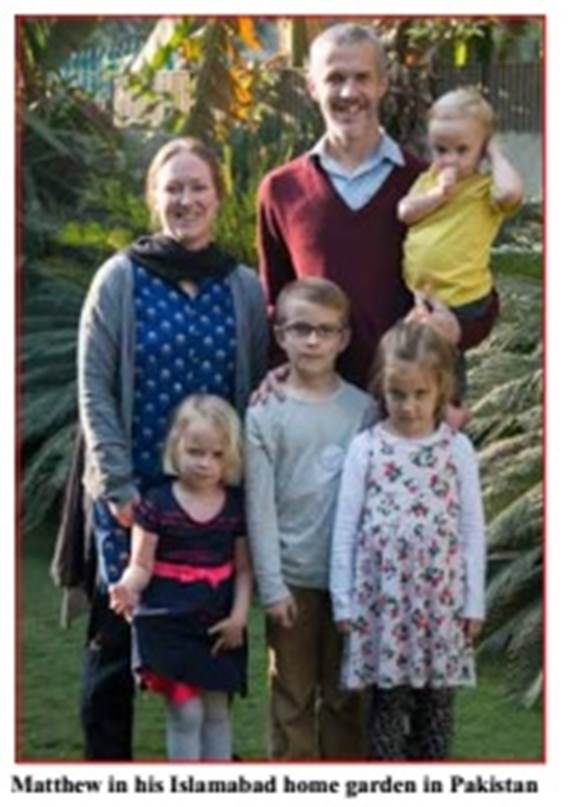

A Book by a Christian on “A Sacred Land”
By Dr Amineh Hoti

The global picture that the world media has built up of Pakistan is a negative one; President Bush, in his time, had told Pakistani leaders, “You are with us, or we’ll bomb you into the stone age!” Despite being president of the most powerful country, America, both show little knowledge and understanding of this deeply historical and culturally rich region.
There are other commendable Americans and Europeans, of course, who are supporting peace projects and working towards peace building.
Having lived in the US, the UK and in Pakistan and engaged in teaching innovative peace building with students at various universities in all three countries and in my travels for fieldwork from Swat to Karachi on the subject of the religions of Pakistan, I am stunned by the diversity of the country and impressed by the humanity and hospitality of its people.
The country has been unfortunate in its lack of good political leadership and representation. Keep in mind its large numbers, with a majority of young population, who are ethnically and religiously very diverse, with Muslims, Christians, Hindus, Parsis, Ba’hais, Buddhists, Sikhs, the Kalash, atheists and so many other people. Pakistan is a country, with largely a poor population that could do with funding for schools, universities and hospitals, solid peace building projects, not threats, not labels, not scapegoating, and definitely not military force. This would be blatant callousness and a disregard for human rights and a violation of millions of innocent human lives.
In this context of unfair escalating hostility and scapegoating with which many people across the world are deeply uncomfortable, I came across Matthew Vaughan who is a Christian Englishman – a graduate from England’s Oxford University and with his English wife and four little (blonde) children – three of whom are born in Pakistan – he has voluntarily chosen to settle and live in Pakistan today where he teaches and helps in charity work. Matthew sees Pakistan as his own “home” and not just any ordinary nation, but a “sacred” one (pg. 20). In his book, Notes from a Sacred Land: Tales of Hope from Pakistan published in 2017 by Print Masters, he compares the beauty of northern Pakistan with its stunning green mountains and rivers to Switzerland and Canada, “Pakistan’s reputation seems undeserved”.
He writes that since moving to Pakistan he realized that

“it is one of the most unjustly maligned countries in the world. The mere mention of its name is sufficient to conjure up images of angry protests, of American flags being burned by mobs, of bombs…of mayhem and guns and destruction and suffering and chaos.” I remember the advertisements for Homeland, the popular TV drama series shown in the US and in UK, in which Pakistan was constantly labeled and scapegoated and many people who have seen the country objected strongly to the image of chaotic streets and bearded lunatics which the producers showed as and in Islamabad. In reality, Islamabad is an organized peaceful city with many trendy young people and many felt this to be a mean and unfair portrayal.
Matthew explains, “This bitter flood of tragedy, unrelenting and sour, is spewed forth by the world’s media until the entire world seems convinced of a few supposed ‘facts’ about Pakistan: that everyone is angry… and plotting the overthrow of the Western world” (Matthew, 2017: 13). Matthew points out that the facts do not match up to its negative image because although every country has its problems, and so does Pakistan, but the image of this beautiful and sacred land is an unfair one and needs to be corrected.
The image of Pakistan is “not representative, and it is not fair” he says (page 14). He adds that the “positive aspects of life in Pakistan are unknown by the people in the West”. And at his book launch Matthew pointed out that when he first wanted to publish his book all the publishers in the West said the book must be a negative book on Pakistan on the subject of terrorism or about the oppression of its women, if it is neither we are not interested as it won’t sell and it won’t make money. “Nobody, they [the publishers] said, wanted to read a positive book about Pakistan” even though this may be the reality (page 14). Matthew protests again “This is simply not fair” (ibid). He writes, “The public image of Pakistan is negative but the hidden face of Pakistan, is far more often than not, beautiful, kind, welcoming, gentle and filled with hope…after living here for six years the description of Pakistan as ‘a sacred land’ seems less and less incongruous to me with every passing day” (Matthew, 2017: page 14).
He writes, “It is bitter to think that Pakistan stands condemned by people who have never experienced it. The images pumped out by the Western media…[are] not true. It does not even come close to being true…hospitality, kindness, and natural beauty are far more representative of this land. In over six years I have not once been insulted, have not once encountered criticism or anger from anyone in Pakistan, have not once been treated with anything but the utmost kindness, despite living in Pakistan during a time of unprecedented global violence and heightened suspicion of foreigners. And this kindness comes, let us not forget, from people who experienced two centuries of subjugation under British rule…Their grace and kindness is unparalleled. The people of Pakistan deserve far more respect than they receive. The problem is that only a small number of travelers are prepared to come to Pakistan to have their lazy assumptions confronted and shattered” (Matthew, 2017: page 20).
Matthew points out, “We live in an era of fear, of widening divisions between different segments of society: rich and poor, immigrants and indigenous, between people of different faiths. All of these divisions affect Pakistan – as a predominantly Muslim nation with key relationships with Western countries; as a nation with large diaspora populations around the world; as a nation containing extremes of poverty and affluence. It seems to me the height of irresponsibility to exacerbate these tensions by allowing a nation as globally significant as Pakistan to be misrepresented. If we want to have peace – and everyone I have met in Pakistan sincerely does – then attempting to understand one another seems like a prudent first step on the convoluted path towards peaceful co-existence. We spend so much time focusing on what makes us different – skin color, religious affiliation, personal wealth, ethnicity – but when do we ever stop to think about what unites us, about what draws us together?”
In my own personal study of genocide: the Jews of Germany, the Bosniaks, the Rohingiyas, and so many other peoples, we found that labeling an ethnic or religious group as ‘terrorists’ was the first step in a terribly careless and irresponsible phase which eventually led to perceiving the other as a threat, leading to the extermination and genocide of innocent human beings. With Pakistan, there are tremendous internal pressures but there are also external threats with countries labeling Pakistan and scapegoating it. This image is unjust and not fair given the vast majority of innocent civilians. 2023 will be an important year for Pakistan and we all pray and hope that sanity prevails and the people of Pakistan are seen globally for what they truly are: a diverse country with many ordinary human beings wanting to live a peaceful life.
Matthew’s book is an important answer to Pakistan’s critics and it must be read by thinking people who care as it is a call to peacebuilding and finally, of course, he says it is “a tribute to the people of one of the most fascinating countries I have had the pleasure of visiting.” ‘Pakistan’ was named ‘The Land of the Pure’ by the great philosophers and visionaries of the South Asian region, because as Matthew, and so many others who have come from abroad and found their stereotypes challenged, have said, “It is a land that I have come to love” (page 13). In conclusion, one must hear the words of Matthew who is a bridge-building Christian who writes from his home in Pakistan as his little children run off to play in the local streets, “As a follower of Jesus Christ, the Prince of Peace, I dearly long to see peace in the world, and for this to happen we need to begin by recognizing that we are all humans, not labels, and all of us deserve to be treated with respect and dignity.” (Matthew, 2017: page 162).

